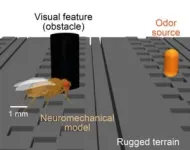(Press-News.org) New study from deCODE genetics/Amgen highlights the importance of BMI in pathogenesis of disease, suggesting that reducing BMI alone could lower the risk of several diseases.
Scientists at deCODE genetics, subsidiary of Amgen, published a study today in Nature Communications that sheds light on how Body Mass Index (BMI) influences the risk of various diseases that are comorbid with obesity. The study, which used genetic data from Iceland and the UK Biobank, looked at whether disease risk associated with BMI-related sequence variants are explained completely or partially by their effect on BMI.
The results showed that for some conditions, such as fatty liver disease, glucose intolerance, and knee replacement, the genetic link to disease disappeared when BMI was taken into account. For other conditions, like type 2 diabetes, heart failure, and stroke, the effects were largely reduced but not entirely explained by BMI.
The study found similar patterns in men and women, although there were some differences, especially for myocardial infarction (heart attack), suggesting that sex may play a role in how BMI influences disease risk. The scientists also noted that other factors, such as changes in BMI over time rather than BMI measured at one point in time or other factors strongly correlated with BMI, might explain some of the remaining risk.
This research highlights the importance of BMI in the pathogenesis of diseases that are more common in obese people than others suggesting that just reducing BMI could lower the risk of these diseases.
END
New study explores the role of BMI in disease risk
New study from deCODE genetics/Amgen highlights the importance of BMI in disease pathology, suggesting that reducing BMI could lower the risk of several diseases.
2024-11-12
ELSE PRESS RELEASES FROM THIS DATE:
Guardian, kids, or companions? What do dogs mean to us today
2024-11-12
What role do dogs play in today’s world? For many, they are more than just pets. New findings from the Department of Ethology at Eötvös Loránd University show that whether seen as friends, family members, children or guardians, these roles affect the way dogs are cared for, suggesting shifting dynamics in human-animal bonds shaped by societal trends and individual owner profiles.
In Western cultures, more and more people see their dogs as their best friends, family members or even their furry children. In fact, ...
NeuroMechFly v2: Simulating how fruit flies see, smell, and navigate
2024-11-12
All animals, large or small, have to move at an incredible precision to interact with the world. Understanding how the brain controls movement is a fundamental question in neuroscience. For larger animals, this is challenging because of the complexity of their brains and nervous systems. But the fruit fly, Drosophila melanogaster, has a smaller and therefore more easily mappable brain, allowing scientists to gain detailed insights into how its nervous system drives behavior.
To understand how the nervous system controls actions, researchers at the group of Pavan Ramdya at EPFL created a simulated reality where a virtual fly can operate ...
“Drowning” mangrove forests in Maldives signal global coastal threat
2024-11-12
Researchers have found evidence that mangrove forests – which protect tropical and subtropical coastlines – are drowning in the Maldives.
Their findings, published today (Tuesday 12 December) in Scientific Reports, indicate that rising sea level and a climate phenomenon known as the Indian Ocean Dipole have led to some Maldivian islands losing over half of their mangrove cover since 2020.
The research team, led by Northumbria University, warn that the findings have implications not only for the Maldives, but also for other island nations and coastal ecosystems around the world.
In 2020, more than a quarter of the Maldivian islands containing mangrove forests saw their trees experiencing ...
When muscles work out, they help neurons to grow, a new study shows
2024-11-12
There’s no doubt that exercise does a body good. Regular activity not only strengthens muscles but can bolster our bones, blood vessels, and immune system.
Now, MIT engineers have found that exercise can also have benefits at the level of individual neurons. They observed that when muscles contract during exercise, they release a soup of biochemical signals called myokines. In the presence of these muscle-generated signals, neurons grew four times farther compared to neurons that were not exposed to myokines. These cellular-level experiments suggest that exercise can have a significant biochemical effect on nerve growth.
Surprisingly, the researchers also ...
Smokers who switch to vaping see improved respiratory health
2024-11-12
A new paper in Nicotine and Tobacco Research, published by Oxford University Press, finds that people who switch from smoking cigarettes to vaping see improved respiratory health, but people who begin consuming electronic cigarettes while continuing to smoke regular cigarettes do not report improved respiratory symptoms.
Adults increasingly use electronic cigarettes to try to quit smoking because of the perceived reduced risk. But while vaping reduces exposure to toxic chemicals, it has been unclear whether switching from cigarettes to e-cigarettes results in a reduction of the respiratory problems—like wheezing and coughing—common in regular cigarette ...
Air pollution emerges as critical environmental risk factor for autism, emerging topic review finds
2024-11-12
Boston, Massachusetts, 12 November 2024 – Environmental exposure to air pollutants during critical developmental periods may significantly impact autism risk, according to a groundbreaking Emerging Topic review published 12 November 2024, in Brain Medicine. The study reveals how common air pollutants, including fine particulate matter and nitrogen oxides, can trigger complex biological cascades affecting brain development.
"Different kinds of neurological disorders, including autism spectrum disorder, can be associated ...
Autism and nitric oxide: Professor Haitham Amal unveils brain disorder breakthrough
2024-11-12
Boston, Massachusetts, 12 November 2024 – The complex interplay between nitric oxide and brain disorders takes center stage in the latest Genomic Press Interview, published November 12, 2024, in Brain Medicine. Professor Haitham Amal, head of the Laboratory of Neuromics, Cell Signaling, and Translational Medicine at the Hebrew University of Jerusalem, shares insights into his groundbreaking research and personal motivation.
“Meeting families and children with autism in Boston during my time at MIT inspired me to focus on a single goal: to help develop biological diagnostics ...
Facing the wind: How trees behave across various forest settings and weather events
2024-11-12
Destructive winds during storms and cyclones often cause tree failures, especially through uprooting and stem breakage. However, how trees respond to wind under various forest configurations and weather conditions remains unclear. A recent study on Cryptomeria japonica plots shows that trees dissipate wind energy by switching between two swaying behaviors at specific wind speeds, offering insights that may help in improved forest management to minimize damage caused by storms.
Extreme weather events, such as tropical and extratropical cyclones and tornadoes, can cause widespread damage to forests, leading to environmental and financial ...
High-performance inkjet print head enhances bioprinting productivity
2024-11-12
Bioprinting is a technology used to create three-dimensional structures, such as human tissues or organs, using bio-inks made of cells and hydrogels. However, conventional inkjet technology has difficulty dispensing bio-inks that are sensitive to temperature due to the heat generated during operation. Furthermore, conventional 3D bioprinting mainly utilizes simple syringe-type printing devices with a single needle, making it time-consuming to produce artificial organs like the brain, lungs, and heart.
The Bionics Research Center team, led by Dr. Byung Chul Lee at the Korea Institute of Science and Technology (KIST, President Sang-Rok Oh), in ...
Opioid use disorder: Updated clinical practice guideline
2024-11-12
La version française suit
Opioid use disorder: updated clinical practice guideline
An updated evidence-based guideline aimed at helping clinicians and other health care providers manage patients with opioid use disorder recommends buprenorphine and methadone as first-line treatments. The guideline is published in CMAJ (Canadian Medical Association Journal). https://www.cmaj.ca/lookup/doi/10.1503/cmaj.241173
Opioid use and opioid use disorder are the leading causes of drug-related deaths worldwide, and Canada ...
LAST 30 PRESS RELEASES:
Brainwaves of mothers and children synchronize when playing together – even in an acquired language
A holiday to better recovery
Cal Poly’s fifth Climate Solutions Now conference to take place Feb. 23-27
Mask-wearing during COVID-19 linked to reduced air pollution–triggered heart attack risk in Japan
Achieving cross-coupling reactions of fatty amide reduction radicals via iridium-photorelay catalysis and other strategies
Shorter may be sweeter: Study finds 15-second health ads can curb junk food cravings
Family relationships identified in Stone Age graves on Gotland
Effectiveness of exercise to ease osteoarthritis symptoms likely minimal and transient
Cost of copper must rise double to meet basic copper needs
A gel for wounds that won’t heal
Iron, carbon, and the art of toxic cleanup
Organic soil amendments work together to help sandy soils hold water longer, study finds
Hidden carbon in mangrove soils may play a larger role in climate regulation than previously thought
Weight-loss wonder pills prompt scrutiny of key ingredient
Nonprofit leader Diane Dodge to receive 2026 Penn Nursing Renfield Foundation Award for Global Women’s Health
Maternal smoking during pregnancy may be linked to higher blood pressure in children, NIH study finds
New Lund model aims to shorten the path to life-saving cell and gene therapies
Researchers create ultra-stretchable, liquid-repellent materials via laser ablation
Combining AI with OCT shows potential for detecting lipid-rich plaques in coronary arteries
SeaCast revolutionizes Mediterranean Sea forecasting with AI-powered speed and accuracy
JMIR Publications’ JMIR Bioinformatics and Biotechnology invites submissions on Bridging Data, AI, and Innovation to Transform Health
Honey bees navigate more precisely than previously thought
Air pollution may directly contribute to Alzheimer’s disease
Study finds early imaging after pediatric UTIs may do more harm than good
UC San Diego Health joins national research for maternal-fetal care
New biomarker predicts chemotherapy response in triple-negative breast cancer
Treatment algorithms featured in Brain Trauma Foundation’s update of guidelines for care of patients with penetrating traumatic brain injury
Over 40% of musicians experience tinnitus; hearing loss and hyperacusis also significantly elevated
Artificial intelligence predicts colorectal cancer risk in ulcerative colitis patients
Mayo Clinic installs first magnetic nanoparticle hyperthermia system for cancer research in the US
[Press-News.org] New study explores the role of BMI in disease riskNew study from deCODE genetics/Amgen highlights the importance of BMI in disease pathology, suggesting that reducing BMI could lower the risk of several diseases.










